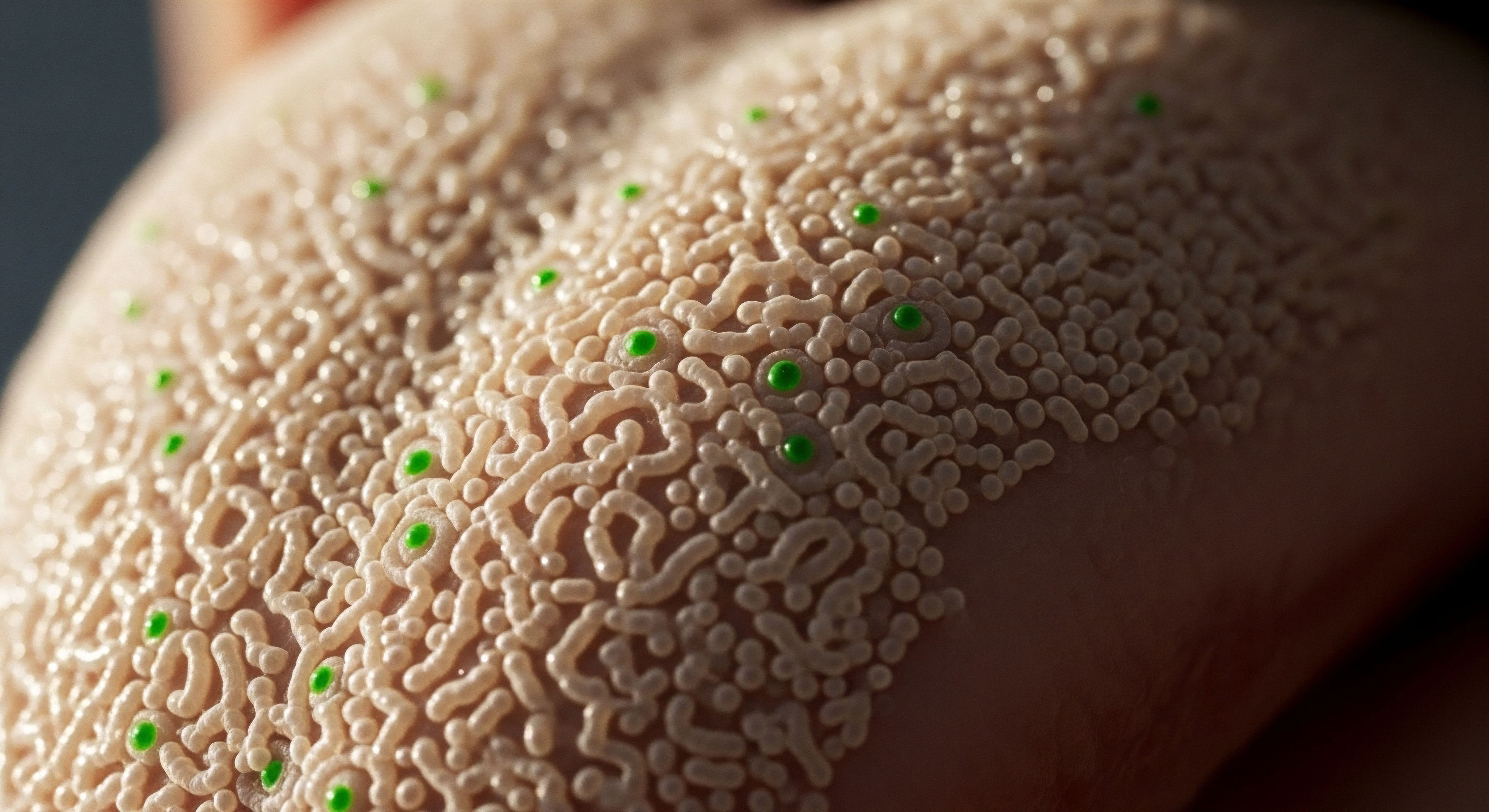

The Body’s Unseen Shifts
The pursuit of an extended, vibrant life moves beyond simple lifespan extension. It transforms into a quest for enduring vitality, a sustained peak state that defies conventional decline. This aspiration finds its grounding in a sophisticated understanding of our internal chemistry, particularly the intricate world of hormones. Hormonal recalibration stands as the decisive frontier in this journey, offering a path to not merely prolong existence but to amplify its every dimension.
Human biology orchestrates a complex symphony of endocrine signals. These molecular messengers govern every aspect of our being ∞ our energy levels, cognitive acuity, body composition, and even our psychological resilience. As decades accumulate, this symphony often loses its precise tuning. Endogenous hormone production, a hallmark of youthful vigor, begins a subtle, then undeniable, descent.
This gradual attenuation creates a cascade of physiological changes that impact performance and well-being. The once-robust feedback loops that maintained equilibrium start to falter, sending imprecise signals throughout the system.

The Diminishment of Core Energetics
Consider testosterone, a critical androgen influencing muscle mass, bone density, libido, and cognitive function in both men and women. Its decline often manifests as reduced physical stamina, a noticeable decrease in drive, and challenges in maintaining a lean physique. Studies indicate that free testosterone levels can diminish by approximately 1-2% annually after age 30, accumulating into substantial deficits over time.
Free testosterone levels decline by 1-2% annually after age 30, significantly impacting muscle mass, cognitive function, and drive.
Estrogen, equally vital for bone health, cardiovascular function, and neuroprotection, follows a distinct trajectory in women, culminating in menopause. The subsequent hormonal shift impacts mood stability, sleep quality, and metabolic efficiency. Growth hormone (GH) secretion also diminishes with age, a phenomenon known as somatopause.
This reduction correlates with decreased muscle protein synthesis, increased adiposity, and a decline in skin elasticity. The pituitary gland’s output of GH, mediated by growth hormone-releasing hormone (GHRH), sees a marked reduction, affecting cellular repair and regeneration across the entire organism.

Metabolic Integrity under Strain
Insulin sensitivity, a cornerstone of metabolic health, also faces challenges with advancing years. Cellular receptors can become less responsive to insulin’s signals, leading to higher circulating glucose levels and an increased risk of metabolic dysfunction. This affects cellular energy production and overall systemic efficiency.
The interplay between these declining hormonal signals and metabolic shifts creates a suboptimal internal environment, eroding the very foundations of peak performance. The body, a high-performance system, experiences a slow but persistent degradation of its operational parameters.
The conventional view often normalizes these changes as an inevitable consequence of aging. A different perspective recognizes them as actionable data points. These signals reveal opportunities for precise intervention. Viewing the body as an exquisitely engineered system allows us to identify where its control mechanisms falter.
We can then apply targeted adjustments to restore optimal function. This approach transforms the passive acceptance of decline into a proactive strategy for biological mastery. The objective extends beyond symptom management; it encompasses the active pursuit of sustained excellence in health and performance.


Precision Bio-Signaling for Internal Equilibrium
Hormonal recalibration represents a sophisticated approach to biological optimization, moving beyond generalized wellness advice. It involves the precise application of therapeutic protocols designed to restore and maintain endocrine balance, thereby enhancing physiological function and extending healthspan. This systems-engineering perspective treats the body as a complex network of interconnected pathways, each amenable to intelligent adjustment.

Targeted Endocrine Restoration
Testosterone Replacement Therapy (TRT) offers a primary example of this precision. For individuals with clinically low testosterone, often presenting with symptoms like persistent fatigue, diminished libido, and reduced muscle mass, TRT re-establishes physiological levels. This intervention improves body composition, boosts energy, and enhances cognitive function.
Dosage and administration protocols are meticulously individualized, guided by comprehensive blood panel analysis and symptom presentation. The goal involves replicating the body’s natural diurnal rhythm of testosterone production where possible, using various esterified forms of testosterone to achieve stable serum concentrations. TRT in women, at lower physiological doses, addresses issues related to libido, bone density, and mood. The focus always remains on restoring a healthy physiological range, not supraphysiological augmentation.
Peptide science represents another cutting-edge modality for recalibration. Peptides, short chains of amino acids, act as signaling molecules, directing specific cellular processes. They offer highly targeted interventions without the broader systemic effects of traditional hormone therapy.
- Growth Hormone Secretagogues (GHS) ∞ Peptides like Sermorelin or Ipamorelin stimulate the body’s natural production and release of growth hormone. This avoids exogenous GH administration while still leveraging its benefits for cellular repair, collagen synthesis, and fat metabolism. GHS peptides interact with specific receptors in the pituitary gland, mimicking the action of endogenous GHRH.
- BPC-157 ∞ This peptide demonstrates remarkable regenerative properties. It accelerates healing in various tissues, including muscle, tendon, ligament, and gut lining. Its mechanism involves modulating growth factor expression and promoting angiogenesis, offering significant benefits for recovery and injury repair.
- TB-500 ∞ A synthetic version of thymosin beta-4, TB-500 aids in tissue repair, cell migration, and blood vessel formation. It promotes healing and reduces inflammation, particularly beneficial for chronic injuries and recovery from intense physical exertion.
These peptides represent a new generation of bio-regulators. They provide the body with precise instructions to optimize its own restorative and anabolic processes. Their application is highly specific, allowing for nuanced adjustments to cellular signaling pathways.

Metabolic Refinement and Neuro-Optimization
Hormonal recalibration extends beyond sex hormones and growth factors. It integrates strategies for metabolic refinement. Insulin sensitivity optimization, through dietary precision, strategic nutrient timing, and targeted supplementation, forms a critical component. Maintaining stable blood glucose levels and efficient insulin signaling minimizes inflammatory cascades and supports sustained energy.
This also preserves pancreatic beta-cell function over the long term. The intricate relationship between insulin, cortisol, and thyroid hormones demands a holistic perspective. Each influences the other, creating a dynamic system where adjustments in one area affect the entire network.
BPC-157 demonstrates regenerative properties by modulating growth factor expression and promoting angiogenesis, accelerating healing in various tissues.
Neuro-optimization also factors into this comprehensive approach. Hormones and peptides significantly influence neurotransmitter balance, cognitive function, and mood. Strategies aimed at supporting the hypothalamic-pituitary-adrenal (HPA) axis, for example, can mitigate the detrimental effects of chronic stress, which directly impacts cortisol and DHEA levels.
A balanced HPA axis ensures mental clarity, emotional stability, and robust stress resilience. This multi-pronged approach considers the body as an interconnected biological machine. Each intervention serves to fine-tune a specific component, contributing to the overall integrity and performance of the system.


The Strategic Horizon of Lifelong Vitality
The question of timing for hormonal recalibration transcends a simple age-based directive. It centers on identifying optimal windows for intervention, recognizing individual physiological landscapes, and understanding the long-term vision of sustained vitality. This strategic timing aligns with a proactive mindset, positioning individuals to anticipate and address shifts in their internal chemistry before they manifest as significant decline.

Indicators for Proactive Engagement
Consideration for hormonal recalibration arises from several key indicators. Persistent, unexplained fatigue, a significant drop in exercise performance, changes in body composition despite consistent effort, and a notable decrease in cognitive sharpness or emotional resilience all serve as critical signals. These are not merely symptoms; they represent data points reflecting potential endocrine imbalances.
For men, a decline in morning erections, reduced libido, or increased body fat around the midsection often points towards diminishing testosterone. Women experiencing perimenopausal or menopausal symptoms ∞ hot flashes, sleep disturbances, mood swings, vaginal dryness ∞ present clear indications for considering estrogen and progesterone optimization.
The decision to engage in recalibration protocols hinges on a thorough diagnostic process. Comprehensive blood panels measuring a wide array of biomarkers, including total and free testosterone, estradiol, progesterone, DHEA-S, thyroid hormones (TSH, free T3, free T4), IGF-1 (for growth hormone status), and metabolic markers like fasting insulin and HbA1c, establish a baseline.
These objective measurements provide the foundation for personalized intervention. They allow for precise titration of therapies and continuous monitoring of progress, ensuring safety and efficacy. Regular follow-up testing becomes indispensable for maintaining optimal ranges and adapting protocols as physiological needs evolve.

The Long Game of Biological Mastery
The commitment to hormonal recalibration signifies a long-term investment in biological mastery. This approach prioritizes preventative and proactive measures over reactive symptom management. It recognizes that maintaining physiological balance throughout life minimizes the cumulative damage associated with age-related decline. The aim extends beyond immediate symptom relief; it encompasses a sustained trajectory of peak performance, enhanced resilience, and extended healthspan. Individuals pursuing this path view their biology as a dynamic system requiring continuous, intelligent oversight.
For instance, early intervention for declining testosterone in men, when clinically indicated, can mitigate the long-term risks associated with hypogonadism, including osteoporosis, sarcopenia, and cardiovascular disease. Similarly, optimizing estrogen and progesterone levels in women during perimenopause can alleviate acute symptoms and protect against bone loss and cognitive decline. The strategic application of peptides, such as those that support growth hormone secretion, can enhance recovery, tissue repair, and overall cellular vitality, extending the body’s regenerative capacity for decades.
The journey of hormonal recalibration defines a commitment to an optimized future. It means making informed choices about the sophisticated tools available for enhancing human biology. This approach cultivates a state of enduring vigor, transforming the experience of aging into a continuous process of refinement and elevation. The future belongs to those who choose to actively sculpt their biological destiny, embracing a life lived at its peak potential.

The Evolved Self ∞ Your Chemical Signature
The era of passive biological decline has ended. A new paradigm emerges, one where understanding and influencing our internal chemistry dictates the very definition of longevity. Hormonal recalibration stands as the cornerstone of this new reality, a sophisticated strategy for those who demand more than mere existence. It represents a profound shift in how we perceive and interact with our own biology, moving from resignation to proactive mastery.
This path offers a precise methodology for reclaiming lost vitality and forging an enduring state of peak performance. It involves an intelligent application of scientific knowledge, a deep respect for the body’s intricate systems, and an unwavering commitment to self-optimization. The result defines a life lived with sustained energy, sharpened cognition, and robust physical capability.
This is not a temporary fix; it defines a fundamental re-engineering of the self, creating a biological signature that radiates resilience and high function across the lifespan.



